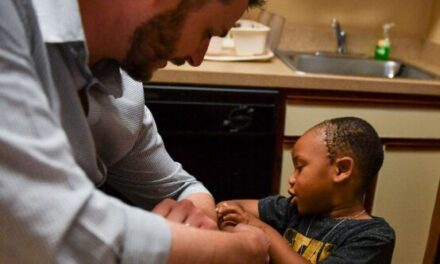|
BEST OF THE WEEK
The week’s best education journalism, all in one place.
|
|
|
🏆 BEST: The best education journalism of the week is the Washington Post story Didi’s voice, which tells the story of Didi Elsyad, one of six Black students in her grade at an elite magnet school in the Washington, DC, area. Emboldened by this year’s activism in response to George Floyd’s murder, the teen decides that it’s up to her to try to take action against the school’s controversial admissions policy. “I am speaking for the silenced majority whose talents for decades have been overlooked,” she said as she details her experiences and challenges officials at the Fairfax County School Board meeting. Did her voice make a difference? The Post’s Hannah Natanson tells a very timely story from the viewpoint of a student, a perspective too often ignored.
🏆 RUNNER-UP: Veteran education journalist Emily Hanford got a scoop for APM Reports with her latest story, Influential literacy expert Lucy Calkins is changing her views. In it, Hanford writes about how Calkins, a polarizing figure in the literacy world, may be reconsidering her views on how children should be taught to read. This piece not only represents a scoop for Hanford but also indicates the evidence of her previous journalism, which has exposed concerns about the widespread use of balanced literacy techniques that do not reflect the latest research and have not proven able to help all kids learn to read.
🏆 SECOND RUNNER-UP: Colorado Public Radio’s Jenny Brundin goes inside the search for absent students with The Denver School That Won’t Give Up On Its Lost Students. Brundin goes along for the ride, literally, with educators and staff as they try to restore the inclusive momentum that was thriving at Denver’s Lake Middle School before COVID-19 hit. By joining the school officials, Brundin sees up close the isolation and challenges the students and their families are enduring during the long months they have spent at home.
🏆 BIG STORY OF THE WEEK: The realities and risks of school reopenings dominated news coverage this week. The 74 (Politics, Not Science, is Driving School Reopening Decisions to a ‘Really Dangerous’ Degree, Research Suggests) and New York Times (Parents Are Worried About Schools. Are the Candidates?) looked at the political role (or lack of). Success stories? NYC seems to be one, according to the New York Times (In NYC schools, only 18 positive coronavirus tests out of 10,676). Of note, New York Magazine took readers Inside the Schools Open Full Time Right Now. The Washington Post (Back to school: Many large districts are opening doors again) and Wall Street Journal (More Schools Are Reopening as Covid-19 Cases Rise Nationwide) took broad views on the reopening trend. NPR asked a good question: Are The Risks Of Reopening Schools Exaggerated? Chalkbeat and the New York Times tried to provide some answers: As more students head back, here’s what we now know (and still don’t) about schools and COVID spread and Schoolchildren Seem Unlikely to Fuel Coronavirus Surges, Scientists Say. |
|
| THE CHALLENGES OF COVERING SCHOOL REOPENINGS — AND HOW JOURNALISTS ARE COMING UP WITH SOLUTIONS |
|
|
The school reopening story is incredibly important and extremely challenging to cover. This week’s columns describe the myriad challenges of covering school reopenings and the strategies education journalists have found to bring useful information to their readers, with the help of editors and reporters from the Atlanta Journal-Constitution, WBEZ Chicago, and the Wall Street Journal.
Some of the strategies they suggest: Report on the messy data that exist — just provide all the caveats, advises US News education reporter Lauren Camera. Don’t try to cover all the “little” stories and individual case counts, says WBEZ education editor Kate Grossman. Move toward roundups and overviews, says the WSJ’s Chastity Pratt. Dig deep and keep track of the disengaged kids, says WBUR education editor Kathleen McNerney. Read all their tips here.
Last week I wrote about the Connecticut Mirror’s Jacqueline Rabe Thomas, the best education journalist you’ve never heard of. The Solutions Journalism Network tweeted, “So excited to see @jacquelinerabe‘s work with @CTMirror getting the celebration it deserves. Consistently impactful, thoughtful stories that embrace complexity.” Thanks for the mention! |
|
|
MEDIA TIDBITS
Thought-provoking commentary on the latest coverage.
|
|
|
Above: Earlier this week on The View, Jill Biden said education would be a top priority for her as First Lady.
📰 NOT FOR THE FIRST TIME: NPR’s Anya Kamenetz addressed a very difficult topic this week with fearless and important journalism. The topic was whether concerns about reopening risks have been exaggerated. Kamenetz has taken this role before. Two years ago, during what many thought was an epidemic of school gun violence, she uncovered serious problems with school gun shooting statistics. Three years ago, she raised the possibility that part of what made Trump’s Education Secretary Betsy DeVos so unpopular was sexism.
📰 CAREFUL WITH THOSE COVID TRACKING DASHBOARDS: In the rush to find and report accurate COVID-19 information, questions of quality and interpretation may have fallen by the wayside, according to Harvard public health professor Joseph Allen. He has some helpful insights for reporters using trackers in their coverage or thinking of creating their own. The gist is that school dashboards that focus narrowly on COVID cases are going to contribute to a narrow understanding of decisions about schools. “Policy choices should not focus on just one outcome,” he writes. “Key metrics should include student learning, engagement and well-being.”
📰 KUDOS TO MECKLER AND STRAUSS: I have been remiss in recognizing the standout work that the Washington Post’s Laura Meckler and Valerie Strauss have been doing covering the national reopening story. Last month, the duo produced a well-reported piece about the early results from school reopenings, featuring data from Texas and New England, along with surprising quotes from folks like AFT head Randi Weingarten. This week, they produced a story built around the results from the Post’s survey of the 50 largest school districts that found that 24 have resumed in-person, 11 more plan to soon, and four others are opening for small groups. They’re not the only ones covering the story, of course, but they’ve been early and their reporting has brought valuable new information into the discussion.
Missed some previous editions? You can see the archive of past newsletters here. |
|
|
PEOPLE, AWARDS
Who’s going where & doing what?
|
|
|
🔥 Congratulations to ProPublica IL’s Jodi S. Cohen and Lakeidra Chavis and the Chicago Tribune’s Jennifer Smith Richards (above) for winning the 2020 Katherine Schneider Journalism Award for Excellence in Reporting on Disability for “The Quiet Rooms.” Also, congrats to NPR’s Cory Turner and everyone else involved in producing “Good Teachers, Bad Deal,” which has now received a Murrow Award. “I am SO grateful to @npr for letting me do work that is both helpful and deeply… fun,” tweeted Turner.
🔥 Wow! The all-star team at the Dallas Morning News’ expanded education desk is going to include Baltimore Sun education alum Tali Richman and San Antonio Report alum Emily Donaldson, along with Corbett Smith and others. Read editor Eva-Marie Ayala’s announcement here.
🔥 ICYMI: Chalkbeat Indiana’s Aaricka Washington wrote a moving first-person piece about how her little brother’s educational experience inspired her to become an education reporter. ProPublica health care reporter Caroline Chen praised former Hechinger Report reporter Emmanuel Felton’s BuzzFeed piece for capturing “the inescapability of segregation; the shock of feeling vulnerable amid BLM protests in a white neighborhood he had chosen in order to avoid the NYPD; finding hope despite.” Writer Amadou Diallo, whose work has also appeared in Hechinger, called it, “one of the most thoughtful pieces on race and privilege in 2020 America.”
🔥 On the move: Veteran education reporter Kate McGee is moving on from WBEZ to start a new position at the Texas Tribune reporting on her old beat of higher education, and Aliyya Swaby is thrilled about it. McGee previously covered education at WAMU public radio. Former Hechinger reporter Bracey Harris got a new job at NBC News Digital.
🔥 Books: Hack Education writer Audrey Watters has a new book coming out called “Teaching Machines.”
Did someone forward you this newsletter? You can sign up here. |
|
EVENTS
What just happened & what’s coming next? |
|
|
⏰ The New York Times’ Erica L. Green was on EWA Radio to talk about her story “A Battle for the Souls of Black Girls” and the “double whammy” of racism and sexism Black girls face in school. Chicago Sun-Times education reporter Nader Issa moderated an event on Wednesday about navigating objectivity in journalism. Chalkbeat story editor Cara (Twin Peaks) Fitzpatrick participated in an event on public education in the pandemic hosted by The 19th, a nonprofit newsroom reporting on gender, politics, and policy. Yes, that was WSJ education editor Chastity Pratt on the panel at the 2020 AERA Brown Lecture in Education Research. She’s everywhere! You can watch the video here. And Joe Biden’s campaign policy director talked about Biden’s education agenda in an EWA webinar Thursday. The video of the webinar is here.
⏰ Jobs: The San Antonio Report is looking for an education reporter. AI.com seeks an editor for its Education Lab and key audiences.
⏰ The International Center for Journalists and the Tow Center for Digital Journalism at Columbia University published a global survey of journalists with “startling and disturbing” results, according to the project authors. Journalists reported that the most difficult part of covering COVID was the psychological and emotional aspect followed by concerns about employment and financial hardship. In May, Grade contributor Wade Tyler Millward wrote about the trials of education journalism during the pandemic. |
|
|
Kudos to Texas high school journalist Gelila Negesse, who wrote for The Dallas Morning News about how COVID has changed education for some of Dallas’ most vulnerable students, including those at her school, North Garland High.
|
|
|
That’s all, folks. Thanks for reading!
Reply to this email to send us questions, comments or tips. Know someone else who should be reading Best of the Week? Send them this link to sign up.
Using Feedly or FlipBoard or any other kind of news reader? You can subscribe to The Grade’s “feed” by plugging in this web address: http://www.kappanonline.org/category/the-grade/feed/.
Read more about The Grade here. You can read all the back issues of The Grade’s newsletter, Best of the Week, here.
|
|
|
|
|



















